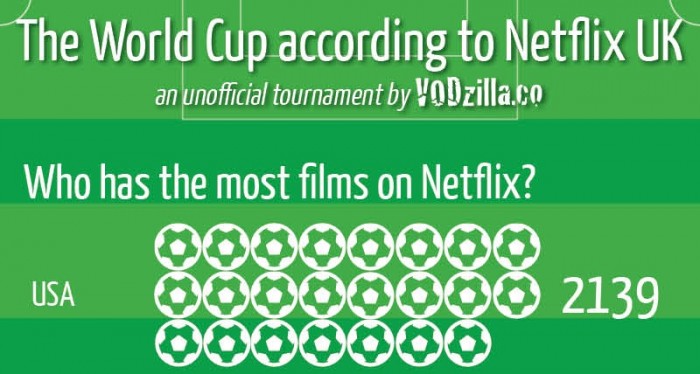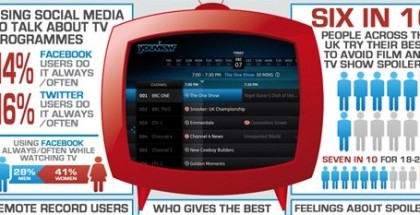The World Cup according to Netflix UK (Infographic)
David Farnor | On 19, Jun 2014
USA would win the 2014 World Cup according to Netflix UK. That’s the finding of VODzilla.co’s World Cup infographic, which uses unofficial figures from the streaming service to pit the sporting countries head-to-head in the VOD arena.
While everyone is going football crazy, VODzilla.co has its head stuck in the digital video cloud – a place where, thankfully, Phil Neville’s commentary doesn’t interrupt every movie.
When a sports tournament isn’t on, Britain spends an increasing amount of time streaming films, which means that the difference between countries on Netflix can have a bigger impact on your life than in football: backing the wrong team out of France and Germany can mean a whole evening wasted. So we set about assembling our own tournament to determine which nation wins at Netflix UK.
How the Netflix World Cup works
It goes without saying that there are a lot of movies on Netflix UK but, luckily, Netflix groups titles by country in its list of genres. We manually went through and made a note of every title listed under each one, as well as their ratings. (Note: Netflix UK lists some TV shows, such as The Blue Planet, under “British Movies”, but as we wanted the tournament to represent the service’s catalogue as accurately as possible, we included these irregularities.)
Of course, the streaming service’s line-up changes on an almost daily basis, with new titles regularly added or removed. That means that a World Cup held next year – or even next month – could have very different results. Our unofficial count of films is based on the site at the start of the 2014 World Cup, one week ago. (We told you there was a lot of counting.)
The VODzilla.co World Cup also measures demand for Netflix in each country, comparing the number of Google searches for “Netflix + COUNTRY” in the month leading up to the start of the tournament.
Once we had three categories ranked for every team in the tournament, we needed to find an overall winner. So we took the top two scoring countries from every World Cup group and then followed the FIFA format to pit winners and runners-up against each other before they advanced to a knockout stage.
Here is what we found:
Winner: Most films – USA
The USA leads the way, with a staggering 2,139 movies on Netflix UK. It comes as no surprise that America – the home of Hollywood – has the highest number of films in the Internet TV company’s catalogue, but what is impressive is just how many films there are: there are more than 10 US films for every one English film on Netflix UK, and more than 6 times the number of US films than the rest of the World Cup teams put together.
England is runner-up with 199 movies, meaning that England and the USA make up 93.5 per cent of Netflix UK’s feature-length library.
Outside of America, Netflix UK’s catalogue is mostly made up of European films, with France offering 40 films, Germany 16, Italy 15, Spain 12 and the Netherlands 9.
World Cup hosts Brazil may be kings on the pitch, but they have just 3 films on Netflix UK – behind South Korea, which has 5.
Russia and Iran are in joint last place with just 1 movie each, behind Argentina and Belgium on 2 apiece.
Perhaps the most revealing result is that there are lots of countries in the World Cup who have no films at all on Netflix UK: Croatia, Cameroon, Chile, Greece, Colombia, Ivory Coast, Uruguay, Costa Rica, Switzerland, Ecuador, Honduras, Bosnia and Herzegovina, Nigeria, Portugal, Ghana and Algeria are all unrepresented at national level on the UK’s most popular VOD platform.
That is not to say Netflix UK’s team sheet lacks diversity: there are many countries not in the World Cup that have films to stream, from Scandinavia’s Denmark (8), Sweden (5) and Finland 1 to Romania (3), Iceland 1, Egypt (2), Tunisia (1), Israel (2) and Palestine (2).
Winner: Best films – Brazil
Quantity is all well and good but as anyone who has scrolled endlessly through Netflix UK’s catalogue will know, the important thing isn’t what’s there, but what’s actually worth seeing.
World Cup hosts Brazil score the highest number of points for quality, with one-third of its films given a rating of 4 out of 5 or higher by Netflix users. Japan comes in a surprise second place, with 1 in 4 of its films rated 4 or higher, ahead of South Korea (1 in 5).
USA, despite (or because of) having so many films to stream, is down in sixth place, with just 13.5 per cent of its films given a top rating. England, on the other hand, may be smaller but boasts better quality, edging ahead of its American rival with 14.1 per cent of its films rated highly. Germany beats England in the quality field, with 18.8 per cent of its movies scoring 4 or more out of 5.
Winner: Google searches – USA
Demand for Netflix is highest in the USA, with 1,600 searches for “Netflix USA” on Google in May 2014. Australia is the second keenest to stream from Netflix, entering 260 searches into Google last month, ahead of Brazil and Mexico (170).
England draws with Germany in the demand stakes, with only 40 searches for Netflix on Google in May – just below France and the Netherlands (70) and just above Switzerland, Italy, Belgium, Costa Rica and Colombia (20).
Netflix is expanding into Germany, France and Switzerland later this year, which will boost the number of searches for Netflix, as demand and awareness of the service increases. It may seem bizarre to see England rank alongside such markets given the prevalence of Netflix, but the World Cup ranks countries individually, while Netflix offers the same catalogue to the whole of the UK – Google searches for “Netflix UK” each month are far higher.
Interest in Netflix is not universal, though: no one searched for the service in Croatia, Cameroon, Ivory Coast, Uruguay, Honduras, Bosnia and Herzegovina, Nigeria, Ghana, Russia and Algeria.
Netflix head-to-head: The Tournament
Brazil and Mexico topped Group A, each with 3 films compared to Croatia and Cameroon’s zero.
Australia and Spain won Group B, again boasting the highest number of films (20 and 12 respectively, compared to 9 for the Netherlands and zero for Chile).
Japan and Colombia edged past Greece and the Ivory Coast in Group C: despite Colombia having no films on Netflix UK, demand for the service was higher, with 20 Google searches for Netflix recorded in May, ahead of 10 in Greece,
The same applied to Switzerland, who joined France in Group E’s top flight, ahead of Ecuador and Honduras.
England and Italy dominated Group D thanks to their high number of films on the service, which also helped Argentina and Iran to accelerate past Bosnia and Herzegovina and Nigeria in Group F.
USA and Germany easily outpaced Portugal and Ghana’s lack of titles in Group G, while South Korea and Belgium enjoyed comfortable qualification from Group H’s unthreatening rivals of Algeria and Russia.
Head to head, Japan sparked the first major upset, jettisoning Italy with its higher demand for Netflix and an impressively high proportion of top ratings. Japan’s quality was no match for Brazil’s unbeatable ratings, though, as the tournament host brushed them aside to reach the Semi-Finals.
Brazil and England emerged as two of the strongest countries on Netflix, with England’s volume of movies easing past Colombia and Australia to reach the other Semi-Final.
In the bottom half of the draw, France reached the Quarter Finals, where the USA promptly knocked it out – a seemingly unstoppable force. Germany, meanwhile, raced past South Korea and Argentina to enter into a confrontation with long-time rival England.
England trounced Germany 2-1 in the Semi-Final, despite Germany’s higher-rated movies, while the USA battered Brazil by the same margin, the Latin American country’s high ratings unable to compete with the USA’s sheer number of titles.
USA ultimately won the Final against England, thanks to its huge range of movies dwarfing those of its British rival. England, though, took home the consolation prize of having better films, with 14.1 per cent of its films rated 4 or higher to America’s 13.5 per cent.
Which begs the question: Is quantity what matters when streaming? Or quality? Someone ask Phil Neville.


















